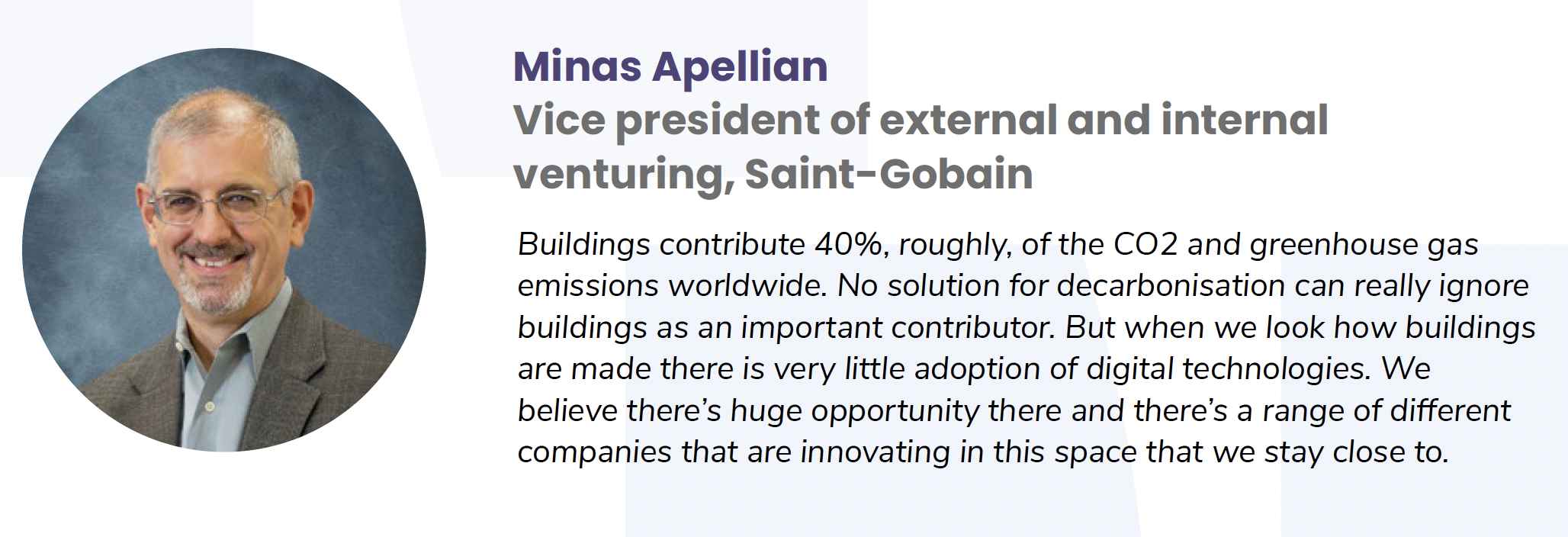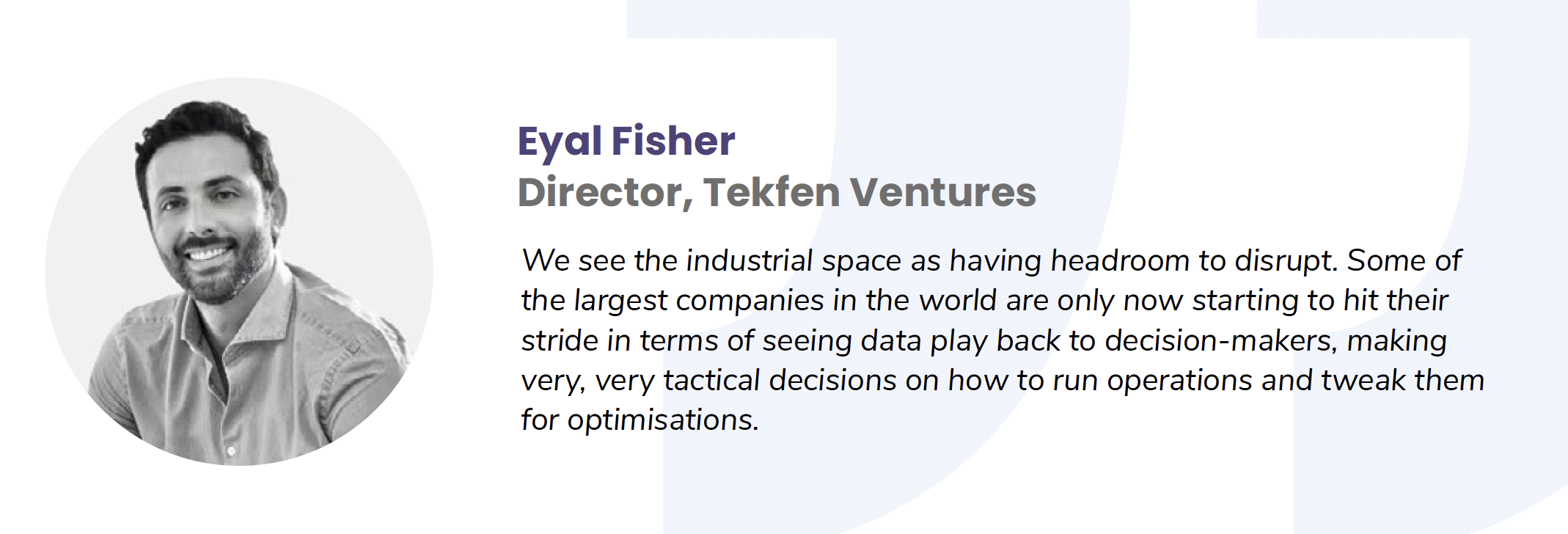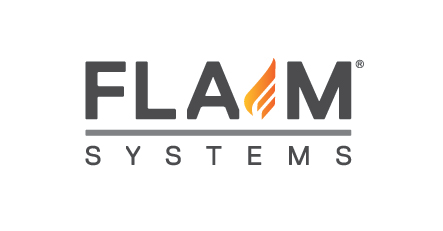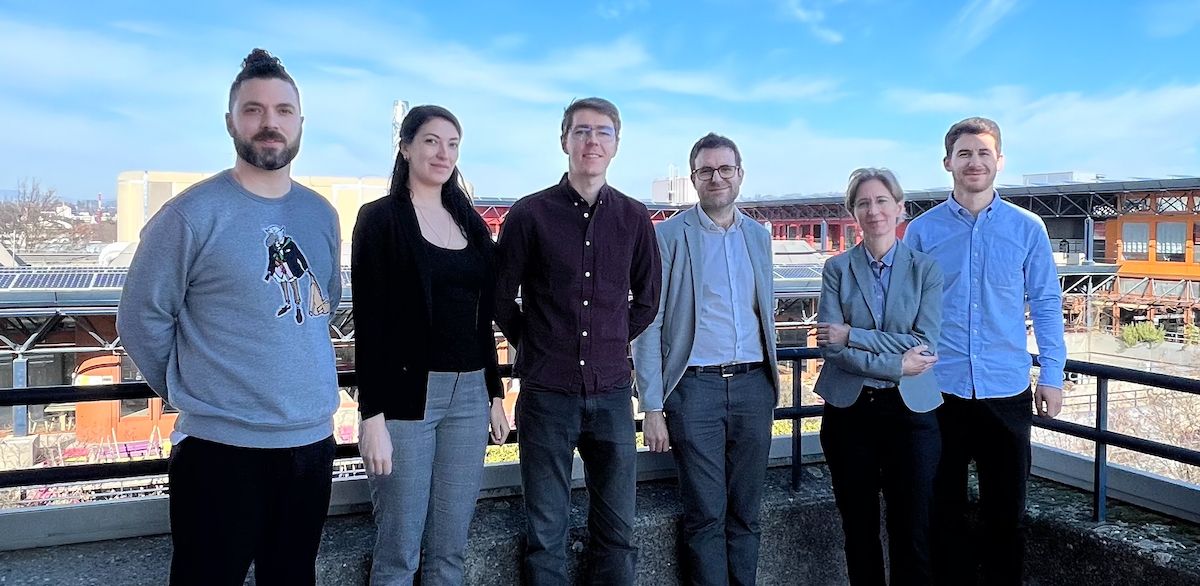
Why does a 350-year-old construction company like Saint-Gobain — which began as a manufacturer of mirrored glass during the reign of the Louis XIV, the Sun King — invest in a small, Icelandic startup creating soundscapes for the metaverse?
Treble Technologies is developing a proprietary technology for sound simulation for use in virtual environments. It is used in computer games and virtual reality applications.
Startups to watch: Seven early-stage startups working on the next stage of digital disruption
But its €8m seed funding round last December also included Saint-Gobain’s Nova investment arm as a backer, because the technology has potential uses for the construction industry. For example, it can simulate the acoustic properties of a building during its design process. Architects already walk clients through immersive visual renders of building using VR headsets. Being able to add a sound simulation to that would take it to another level.
“As an architect, you could make some design choices and show your customer what the hospital room, the classroom or the restaurant will sound like,” says Minas Apellian, vice president of external and internal venturing at Saint-Gobain. “We’re excited about that, because we believe that there’s a very imperfect understanding of the influence of the choice of materials on comfort as a whole — and in particular, the acoustical environment.”
Treble has collaborated with building industry firms including Henning Larsen Architects, BIG Architects, and COWI.

The investment in Treble Technologies is just one of many deals over the past year that are bringing digital transformation into industries that have previously seemed hard to digitise.
Tekfen Ventures, the investment arm of Turkey’s Tekfen Holdings, an industrial conglomerate whose activities span everything from agriculture to steelworks, sees huge potential in digitising heavy industry.
“We see the industrial space as having headroom to disrupt,” says Eyal Fisher, director of Tekfen Ventures. He says he is frequently surprised by how little progress some of the biggest industrial operators in the world have made in adopting new digital tools.
“We’re talking about some of the most sophisticated companies in the world. You know, it’s actually quite dumbfounding, to realise that they’re still working with Excel,” says Fisher. Manufacturing companies, he says, are some of the biggest producers of data, but little of that is captured and used to make improvements.
A McKinsey report on digitalisation of the industrials sector noted that digital supply chain improvements alone could bring between 1% and 2% revenue improvements if fulfilment times were speeded up, while material spend could go down between 5% and 10%. A number of other measures, from advanced analytics for pricing to monitoring labour force efficiency on the factory floor, would bring cost reductions or sales increases of this kind of magnitude.

One of Tekfen Venture’s big bets has been funding Sight Machine, the US startup that has developed a data analytics platform that uses machine learning to help manufacturers improve their processes and productivity. The company works with a number of big clients including BASF and GE. A number of corporate-backed investors have taken stakes in the company, including Sony Innovation Fund, M Ventures and E.On.
Sight Machine, founded in 2012, is not a new entrant and has raised $59.9m to date. Fisher says it a sign of how long it can take to break into the industrial sector and change decades-old practices. He believes there is still a lot of low-hanging fruit in the sector around data analysis, even without moving on to more bleeding edge technologies like VR or Web3.
“Some of the largest companies in the world are only now starting to hit their stride in terms of seeing data play back to decision-makers, making very, very tactical decisions on how to run operations and tweak them for optimisations,” he says.

But advances in AI, computing, and connectivity are also part of the reason digital transformation reaches previously unreachable areas, says Nicolas Sauvage, president of TDK Ventures, the investment arm of TDK, the Japanese multinational electronics company.
“We’re starting to see digital transformation being widespread and more responsible than ever before, but also accelerating to a level that has never been seen before,” says Sauvage.
This is one of the reasons TDK Ventures organises a digital transformation week every year in multiple locations, where it brings in visionary tech leaders — for example John Hennessy, chairman of Alphabet — to talk about what is coming next.
“Some of the changes are incremental, some transformational, but we want to capture all of this and share our insights in the space,” says Sauvage.
Digital transformation is something that has been talked about for more than 20 years, starting in sectors like banking and now gradually fanning out into the industrial and manual sectors. Some of the new crop of startups we have seen emerge in this sector over the past year are focused on areas like forestry, firefighting and factory robots.
“Different industries, different sectors, different types of businesses are in very different places in terms of the maturity of adoption,” says Saint-Gobain Nova’s Apellian.“But there is no sector now, that isn’t actively engaged in trying to bring digital transformations to what they do. The recognition of the value and need to do it is ubiquitous.”
Startups to watch

Carbon Re
- Based: UK
- Founded: 2020
- Funding to date: $6.9m
“Cement is one of the biggest contributors to climate change and carbon emissions,” says Sherif Elsayed-Ali, co-founder and chief executive of Carbon Re. In fact, cement production alone is responsible for 8% of all carbon dioxide emissions worldwide. Carbon Re, a spinout of University of Cambridge and University College London, is developing machine learning software that can help cement makers cut these emissions by optimising fuel use in the pre-heater and kiln processes.
“Heating up limestone is responsible for half of the emissions in cement,” explains Elsayed- Ali. “We take hundreds of data points to build a digital twin of the process, then run live optimisations.” Carbon Re will recommend specific settings for a plant, which Elsayed-Ali says can lead to an 8% to 10% drop in fuel use.
Carbon Re has two other products, for the manufacture of glass and steel, which are still under research. The team is working with non-profit organisations such as ResponsibleSteel on testing.
Carbon Re was co-founded by chief operating officer Buffy Price, chief scientific officer Daniel Summerbell, chief technology officer Aidan O’Sullivan and Elsayed-Ali. The company secured a $5m in seed round in 2022 led by Planet A Ventures, with participation from UCL Technology Fund, tech transfer office Cambridge Enterprise and Clean Growth Fund.

Emesent
- Based: Australia
- Founded: 2018
- Funding to date: $23.6m
Drones have obvious uses in construction and mining, and PwC forecasts that this could eventually become a $28.3m global market. But usage of drones by these industries has so far been held back by the inaccuracy of location and the fact that fog and rain can severely hamper use.
Australia-based startup Emesent is working on a technology to solve these issues. It specialises in drone autonomy, LiDAR mapping and data analytics through its Hovermap ST which can capture data in beyond line-of-sight areas that were once considered inaccessible or were GPS denied areas.
Stefan Hrabar, the company’s chief executive officer, and Farid Kendoul, the chief technology officer founded Emesent in 2018. Combined, the two have nearly 40 years of experience in the autonomous vehicles and aircraft sector, with Hrbar previously serving 12 years at the Australia-based national science agency, CSIRO as a senior research scientist and research team leader in aerial robotic inspection.
Since its launch, Emesent has raised $23.6m in funding. In 2022, the company raised $23m in a funding round led by Australian investment firm Perennial Partners with Tiger Global participating.
Telus Ventures, the corporate venture arm of the Canada-based telecommunications conglomerate Telus also provided significant funding which Emesent has used to open offices within the US and UK to extend its services to more industries.

Flaim Systems
- Based: Australia
- Founded: 2017
- Funding to date: $5.8m
Some $1.6bn to $5.9bn is spent every year on treating firefighter injuries, according to the US Fire Administration, with some 14% of those injuries happening in training. Flaim Systems, an Australia-based VR company, is hoping to change these statistics with a fully immersive platform that simulates real world emergencies, but allows firefighters to train more safely.
The platform includes a vest that reproduces the heat intensity firefighters would experience, stress level tracking and uses standard firefighting equipment too. The technology simulates high rise buildings, gas stations and rural fires. It collects biometric biometric performance data and provides real time training feedback.
In addition to supporting professional firefighters, the company has developed a version that helps train corporations on safety training and accurate fire extinguisher handling. A spinout of Deakin University, Flaim Systems was founded in 2017 by James Mullins, the chief technology officer who is also a third-generation rural firefighter.
The spinout has raised a total of $5.8m which they hope to use to further commercialise the company and their product. It recently raised $4.4m in a series A round with investors ranging from Deakin University, Significant Capital Ventures and Breakthrough Victoria, who also took a minority stake in the business for $3.3m.

Ollo Factory
- Based: Japan
- Founded: 2019
- Total funding to date: n/a
Factory automation has come a long way since the industrial robot was patented by George Devol in 1954 in the US. Any kind of factory today will include some automation. Yet, some tasks still need to be done by hand and human error will inevitably creep in.
This is where Ollo Factory comes in. The spinout of University of Tokyo’s Matsuo Lab has developed a palm-sized edge device, called Ollo Box, equipped with artificial intelligence as well as facial and behavioural recognition to track all work on a factory floor. It monitors the site in real time and detects variation in work and, just as importantly for a company’s bottom line, it detects waste.
It does all of this without requiring a large amount of training data. Instead, a webcam films just one cycle of a work process and can start analysing immediately.
The technology has applications outside the factory, too. The Ollo Box can be used, for example, to record employee attendance at a meeting. Just upload a single photograph from each person and the company claims a 99.81% accuracy for facial recognition from that.
Founded in 2019, Ollo Factory has backing from management consultancy Industrial Growth Platform, which invested in the startup in 2020 and participated in a ¥200m ($1.45m) series A round in 2022. The series A also attracted SoftBank’s Deepcore and Deep30, which invests in technologies emerging out of the Matsuo Lab.

Treble Technologies
- Based: Iceland
- Founded: 2020
- Funding to date: $13.6m
While most of the hype around the metaverse focused on the visual side and the VR headsets, an equally important aspect of creating an immersive experience is sound. In order to create a realistic virtual world, you need to have accurate spatial audio — giving the impression of sound coming from the right direction, the echo of a room, and other ambient noises.
Treble Technologies has developed proprietary technology for sound simulation and spatial audio specifically for use in virtual environments. The cloud-based platform connects with leading gaming engines and 3D modeling software allowing for the design of more realistic soundscapes than presently accustomed to.
While hype about the metaverse may have died down recently, the Treble team is pursuing real commercial opportunities in working with architects, such as Henning Larsen Architects, BIG Architects, and COWI. Architects can use the sounds simulation platform to model how different bulding material choices will affect the accoustic of a building. Henning Larson, for example, used this in the design of the Uppsala Town Hall. The company is also working with automotive engineers and designers on a similar solution for use in car design.
Treble Technologies was founded in early 2020 by Finnur Pind and Jesper Pedersen, a couple of acoustic engineers with extensive experience and expertise in sound simulation. It has raised $13.6m to date, including a €5.5m seed round in which Saint-Gobain Nova took part.

Vibrant Planet
- Based: US
- Founded: 2020
- Total funding to date: $24.2m
Forestry management, with its largely manual and analogue processes, may seem like one of the last industries in need of a cloud-based platform. But precision forestry is an emerging sector that was worth $4bn in 2022.
Vibrant Planet was set up as a public benefit corporation in 2020 by chief scientist is Hugh Safford, who has spent the past two decades as a research ecologist at University of California, Davis, and has worked on several solutions for climate, forest and fire challenges for the US Department of Agriculture’s Forest Service.
Vibrant Planet’s platform helps government agencies like the Forest Service, as well as NGOs and fire departments, with treatment planning, monitoring and wildlife preservation.
It uses lidar to create a 3D map and fills in the gaps with machine learning (because dense forests are difficult to map). AI and satellite imagery keep the map updated.
The company launched in California soon after 6.5m of the state’s 33m forested acres had burned in fire seasons. Vibrant Planet’s 17m seed round last year was led by the Ecosystem Integrity Fund and Jeremy and Hannelore Grantham Environmental Trust. It included a consortium of eight others including network equipment manufacturer Cisco’s impact investment fund Cisco foundation.
In-depth: AICA gives robots “a sense of touch”

AICA
- Based: Switzerland
- Founded: 2019
- Total funding to date: $1.5m
Robots have become ubiquitous in factories, with over 2.7m of them in operation today, according to Strategic Market Research. But they still have limitations, with training and reprogramming still resulting in significant downtime.
Add in some machine learning, though, and you start to get robots that can learn and adapt to changing environments in real time. Switzerland-based AICA is one of the startups working at the forefront of this having created software that gives robots “a sense of touch”.
“What differentiates our technology from our competitors is how we control the robots and integrate sensors in our framework,” says Baptiste Busch, the chief executive officer and co-founder of AICA, “Working with collaborative robots has a different type of controlling strategy which is responsive to external feedback and the majority of our competitors tend to not work in real time, as they plan obstacles and paths in advance, whereas we have technology that reacts and controls the robot immediately.”
To be agile, robots have to consider various factors such as customised manufacturing changes, object size and different force levels, which can be difficult to programme in with current robotics software.
“You want a robotic program to go from point A to point B,” he says, “But as soon as the factory requires a more dynamic response, such as a taking into consideration a changing environment, you need completely change the way you control robots.”
“The industry is failing to meet the needs of reprogramming which is why companies like are receiving attention,” says Busch. “SMEs want to integrate automation but the problem is cost. In addition, there is a shortage of manual labour with workers quitting those tedious jobs that automotive machines can do.”
Busch says that these factors have meant that investors are keen to invest in technologies, especially around AI, that disrupt the way that robots have functioned for decades.
AICA has opted to focus on software, staying out of the already crowded hardware side of the market.

“There are already enough robotics manufacturers in the market, so creating just another hardware manufacturing company means competing with major conglomerates, which seems counterintuitive,” he says.
“Instead of wasting resources on more robots, our technology can collect existing and new robots and provide an advanced control strategy and more integration ease with sensors and machine learning.”
AICA plans to release the software as a developer license so that older robotic developers can make applications with it.
Founded in 2019, AICA’s leadership team includes Enrico Eberhard, the chief technology officer and Fabien Antonatos, the chief business development officer. An engineering expert, Busch previously worked as a research engineer for France-based robotics manufacturer, AIO.
A spinout from the École Polytechnique Fédérale de Lausanne (EPFL), the university has played a crucial role in the research and financing of AICA.
Corporate investment and maintaining partnerships
AICA has raised a total of $1.5m including a $1.3m seed funding round with backers including Schaeffler Group, the German-based automotive manufacturing corporation and venture capital firms, Spicehaus Partners and High-Tech Gründerfonds.
“Schaeffler Group’s investment is a true acknowledgment of how important our solutions are for them and their desire to
push it into their production, with the likelihood of them being the first corporation to deploy it into their production facility,” says Busch.
AICA continues to seek more partnerships and potential investors.
“We are playing with the ecosystem so it’s important to find partners with robot manufacturers who will not view us as potential competitors and integrators and distributors that will be using our software for their own needs or will be pushing our product to market,” says Busch.
If you would like to learn more about digital transformation you can view the talks and events at TDK Ventures’ DX week here.
